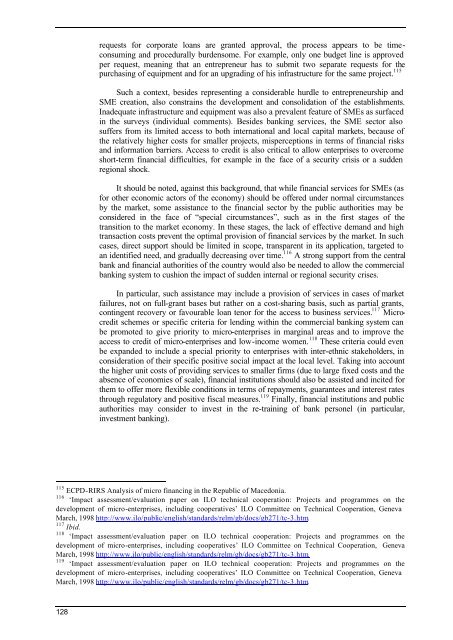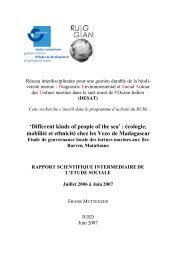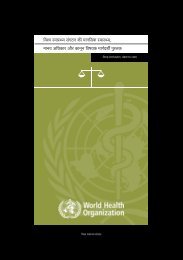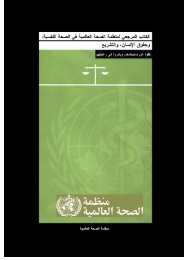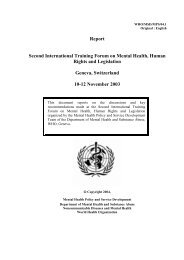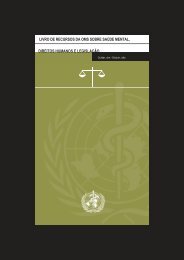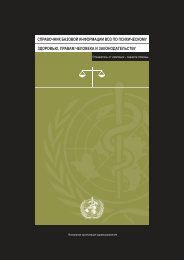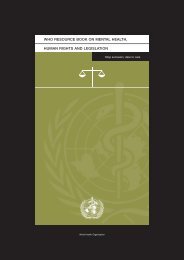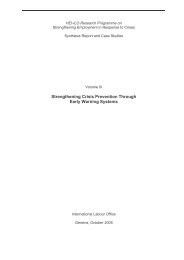Volume 1 Cedric - revised luca Final - RUIG-GIAN
Volume 1 Cedric - revised luca Final - RUIG-GIAN
Volume 1 Cedric - revised luca Final - RUIG-GIAN
Create successful ePaper yourself
Turn your PDF publications into a flip-book with our unique Google optimized e-Paper software.
equests for corporate loans are granted approval, the process appears to be timeconsumingand procedurally burdensome. For example, only one budget line is approvedper request, meaning that an entrepreneur has to submit two separate requests for thepurchasing of equipment and for an upgrading of his infrastructure for the same project. 115Such a context, besides representing a considerable hurdle to entrepreneurship andSME creation, also constrains the development and consolidation of the establishments.Inadequate infrastructure and equipment was also a prevalent feature of SMEs as surfacedin the surveys (individual comments). Besides banking services, the SME sector alsosuffers from its limited access to both international and local capital markets, because ofthe relatively higher costs for smaller projects, misperceptions in terms of financial risksand information barriers. Access to credit is also critical to allow enterprises to overcomeshort-term financial difficulties, for example in the face of a security crisis or a suddenregional shock.It should be noted, against this background, that while financial services for SMEs (asfor other economic actors of the economy) should be offered under normal circumstancesby the market, some assistance to the financial sector by the public authorities may beconsidered in the face of “special circumstances”, such as in the first stages of thetransition to the market economy. In these stages, the lack of effective demand and hightransaction costs prevent the optimal provision of financial services by the market. In suchcases, direct support should be limited in scope, transparent in its application, targeted toan identified need, and gradually decreasing over time. 116 A strong support from the centralbank and financial authorities of the country would also be needed to allow the commercialbanking system to cushion the impact of sudden internal or regional security crises.In particular, such assistance may include a provision of services in cases of marketfailures, not on full-grant bases but rather on a cost-sharing basis, such as partial grants,contingent recovery or favourable loan tenor for the access to business services. 117 Microcreditschemes or specific criteria for lending within the commercial banking system canbe promoted to give priority to micro-enterprises in marginal areas and to improve theaccess to credit of micro-enterprises and low-income women. 118 These criteria could evenbe expanded to include a special priority to enterprises with inter-ethnic stakeholders, inconsideration of their specific positive social impact at the local level. Taking into accountthe higher unit costs of providing services to smaller firms (due to large fixed costs and theabsence of economies of scale), financial institutions should also be assisted and incited forthem to offer more flexible conditions in terms of repayments, guarantees and interest ratesthrough regulatory and positive fiscal measures. 119 <strong>Final</strong>ly, financial institutions and publicauthorities may consider to invest in the re-training of bank personel (in particular,investment banking).115 ECPD-RIRS Analysis of micro financing in the Republic of Macedonia.116 ‘Impact assessment/evaluation paper on ILO technical cooperation: Projects and programmes on thedevelopment of micro-enterprises, including cooperatives’ ILO Committee on Technical Cooperation, GenevaMarch, 1998 http://www.ilo/public/english/standards/relm/gb/docs/gb271/tc-3.htm.117 Ibid.118 ‘Impact assessment/evaluation paper on ILO technical cooperation: Projects and programmes on thedevelopment of micro-enterprises, including cooperatives’ ILO Committee on Technical Cooperation, GenevaMarch, 1998 http://www.ilo/public/english/standards/relm/gb/docs/gb271/tc-3.htm.119 ‘Impact assessment/evaluation paper on ILO technical cooperation: Projects and programmes on thedevelopment of micro-enterprises, including cooperatives’ ILO Committee on Technical Cooperation, GenevaMarch, 1998 http://www.ilo/public/english/standards/relm/gb/docs/gb271/tc-3.htm.128


